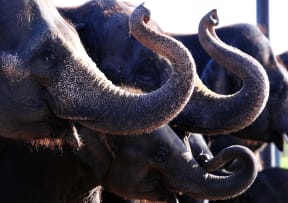Elephants are able to differentiate between ethnicities and genders, and can tell an adult from a child - all from the sound of a human voice.

Photo: AFP
This is according to a study - published in Proceedings of the National Academy of Sciences - in which researchers played voice recordings to wild African elephants.
The animals showed more fear when they heard the voices of adult Masai men, the BBC reports.
Livestock-herding Masai people do come into conflict with elephants, and this suggests that animals have adapted to specifically listen for and avoid them.
Karen McComb and Graeme Shannon of the University of Sussex, who led the study, explain that in previous research they had used similar playback experiments to reveal that elephants could tell - from the sound of a lion's roar - whether the animal was a female or a more dangerous male.
Other studies have shown that elephants respond with fear to the scent and even to the red colour of the Masai clothing.
"I've experienced that," says Professor McComb. "If you give a Masai man a lift in your car, you can see the elephants behave in a different way around you. They're much more wary of the car and you see a lot of smelling and listening."
Camouflaged loudspeaker
Professor McComb wanted to find out if the animals used their very acute sense of hearing to identify a potential threat from humans, so recordings were made of Masai men, women and children saying, in their own language, "Look, look over there, a group of elephants is coming".
They also recorded Kamba men saying this phrase.
While cattle-herding Masai people often encounter free-ranging elephants, which can result in violent conflict, the Kamba people's more agricultural lifestyle does not generally bring them into aggressive contact with the animals.
When the team played recordings of these different voices through a camouflaged loudspeaker, they found that elephant family groups reacted more fearfully in response to the voice of a Masai man than to a Kamba man's voice - retreating and bunching together defensively.
And the adult male Masai voices triggered far more of these defensive reactions than the voices of women or boys.

